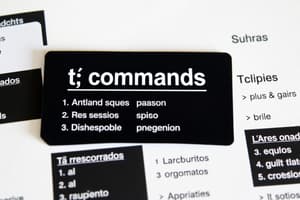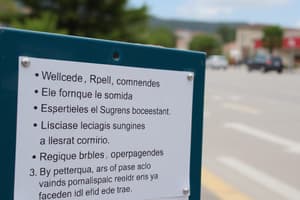Podcast
Questions and Answers
How do you do the affirmative tú command form?
How do you do the affirmative tú command form?
It is the same as the él, ella, ud. form of the present tense of the verb. -AR = -a, -ER/IR = -e.
What are eight common verbs with irregular affirmative tú commands?
What are eight common verbs with irregular affirmative tú commands?
Decir, Hacer, Salir, Ser, Ir, Poner, Tener, Venir.
What is the informal command for 'decir'?
What is the informal command for 'decir'?
di
What is the informal command for 'hacer'?
What is the informal command for 'hacer'?
What is the informal command for 'salir'?
What is the informal command for 'salir'?
What is the informal command for 'ser'?
What is the informal command for 'ser'?
What is the informal command for 'ir'?
What is the informal command for 'ir'?
What is the informal command for 'poner'?
What is the informal command for 'poner'?
What is the informal command for 'tener'?
What is the informal command for 'tener'?
What is the informal command for 'venir'?
What is the informal command for 'venir'?
How do you form the negative tú of informal commands?
How do you form the negative tú of informal commands?
Verbs ending in -car, -zar, -gar have spelling changes only in negative tú command.
Verbs ending in -car, -zar, -gar have spelling changes only in negative tú command.
What changes are made for -car, -zar, -gar verbs in the negative tú command?
What changes are made for -car, -zar, -gar verbs in the negative tú command?
What is the rule for object and reflexive pronouns in tú commands?
What is the rule for object and reflexive pronouns in tú commands?
How do you form los mandatos formales?
How do you form los mandatos formales?
Verbs ending in -car, -zar, -gar have spelling changes in the ud. and uds. commands.
Verbs ending in -car, -zar, -gar have spelling changes in the ud. and uds. commands.
What are the irregulars in the form of formal commands?
What are the irregulars in the form of formal commands?
What is the formal command for 'dar'?
What is the formal command for 'dar'?
What is the formal command for 'estar'?
What is the formal command for 'estar'?
What is the formal command for 'ir'?
What is the formal command for 'ir'?
What is the formal command for 'saber'?
What is the formal command for 'saber'?
What is the formal command for 'ser'?
What is the formal command for 'ser'?
Flashcards
Affirmative tú command formation
Affirmative tú command formation
Use the él/ella/Ud. form of the present tense. -AR verbs change to -a, and -ER/-IR verbs change to -e.
Common verbs with irregular affirmative tú commands
Common verbs with irregular affirmative tú commands
Decir, Hacer, Salir, Ser, Ir, Poner, Tener, Venir
Informal command for 'decir'
Informal command for 'decir'
di
Informal command for 'hacer'
Informal command for 'hacer'
Signup and view all the flashcards
Informal command for 'salir'
Informal command for 'salir'
Signup and view all the flashcards
Informal command for 'ser'
Informal command for 'ser'
Signup and view all the flashcards
Informal command for 'ir'
Informal command for 'ir'
Signup and view all the flashcards
Informal command for 'poner'
Informal command for 'poner'
Signup and view all the flashcards
Informal command for 'tener'
Informal command for 'tener'
Signup and view all the flashcards
Informal command for 'venir'
Informal command for 'venir'
Signup and view all the flashcards
Forming negative tú commands
Forming negative tú commands
Signup and view all the flashcards
-car, -zar, -gar changes in negative tú command only?
-car, -zar, -gar changes in negative tú command only?
Signup and view all the flashcards
-car, -zar, -gar verb changes
-car, -zar, -gar verb changes
Signup and view all the flashcards
Pronoun placement in tú commands
Pronoun placement in tú commands
Signup and view all the flashcards
How do you form 'los mandatos formales'?
How do you form 'los mandatos formales'?
Signup and view all the flashcards
-car, -zar, -gar spelling changes in formal commands?
-car, -zar, -gar spelling changes in formal commands?
Signup and view all the flashcards
Irregular formal commands
Irregular formal commands
Signup and view all the flashcards
Formal command for 'dar'
Formal command for 'dar'
Signup and view all the flashcards
Formal command for 'estar'
Formal command for 'estar'
Signup and view all the flashcards
Formal command for 'ir'
Formal command for 'ir'
Signup and view all the flashcards
Formal command for 'saber'
Formal command for 'saber'
Signup and view all the flashcards
Formal command for 'ser'
Formal command for 'ser'
Signup and view all the flashcards
Study Notes
Affirmative Tú Commands
- Affirmative tú command form mimics the él, ella, usted present tense form.
- For -AR verbs, use -a; for -ER/IR verbs, use -e.
Common Irregular Affirmative Tú Commands
- Eight frequently used verbs with irregular forms:
- Decir: di
- Hacer: haz
- Salir: sal
- Ser: sé
- Ir: ve
- Poner: pon
- Tener: ten
- Venir: ven
Negative Tú Commands
- To form negative tú commands, use the present tense yo form:
- Drop the -o ending.
- Add -es for -AR verbs.
- Add -as for -ER/-IR verbs.
- Verbs ending in -car, -zar, -gar undergo spelling changes:
- c becomes qu
- g becomes gu
- z becomes c
Pronouns in Tú Commands
- Object and reflexive pronouns attach to the end of affirmative commands.
- If the command has more than two syllables, an accent mark is added over the stressed vowel.
- In negative commands, pronouns precede the verb.
Formal Commands (Los Mandatos Formales)
- To create formal commands, also use the yo form of the present tense:
- Drop the -o ending.
- Add -e(n) for -AR verbs.
- Add -a(n) for -ER/-IR verbs.
- Formal commands also see spelling changes for -car, -gar, -zar verbs:
- c becomes qu
- g becomes gu
- z becomes c
Irregular Formal Commands
- Irregularities exist in formal commands for these verbs:
- Dar: dé(n)
- Estar: esté(n)
- Ir: vaya(n)
- Saber: sepa(n)
- Ser: sea(n)
Studying That Suits You
Use AI to generate personalized quizzes and flashcards to suit your learning preferences.




